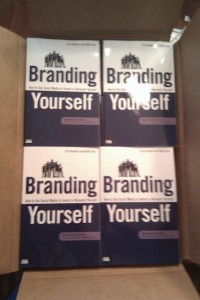So I’m bugging the bejeezus out of this poor woman at a coffee shop, asking to look at one of her books when she’s obviously working hard writing something very scholarly. The name of the book? Professors as Writers: A Self-Help Guide to Productive Writing.
Having been in higher education for a number of years, and having written a number of scholarly works (and being the son of a professor myself), I was naturally curious what those Ivory Tower residents are talking about writing. I open it up to the first chapter and see:
Telling a writer to relax is like telling a man to relax while being prodded for a hernia. . . He thinks the article must be of a certain length or it won’t seem important. He thinks how august it will look in print. He thinks of the people who will read it. He thinks that it must have the solid weight of authority. He thinks that its style must dazzle. No wonder he tightens. — W. Zinsser, On Writing Well
Wow, I didn’t know writing had to be that hard. I’ve just sort of, well, done it. I never had writer’s block, because I’ve never worried about what other people thought of my writing, except for a few people. I quit worrying about what it would look like in print after the second time it was printed. I never worried about whether it made other people laugh, only if it made me laugh. (Coincidentally, the stuff I think is hilarious never gets that many compliments, but the stuff I think is just throwaway crap I needed to fill a word count is the stuff that gets rave reviews from readers.)
So quit worrying already and start writing. You’re not writing for posterity, for future generations, or for tens of thousands of readers. You’re writing for yourself. You’re writing what makes you happy, what pleases you, what brings you joy. If you like writing mystery novels, then write mystery novels. If you like writing blog posts, then write blog posts. But write your mystery novels, write your blog posts.
They’re not for someone else, they’re for you.
Writers loosen up once they start writing for themselves and stop thinking about the reader. Quit thinking about The Reader.
We all have a mythical buildup in our mind about The Reader. Our writing teachers always tell us to “think of The Reader, don’t forget The Reader.” But you’re not writing for The Reader. Once you start thinking about The Reader — that genderless, faceless judgmental bureauratic-minded nerd who’s all set to jump on your writing with a shrill “a-ha!” — you’re stuck, because you’re always trying to please him*. The only person you have to please is yourself. Pleasing everyone else is just gravy. (*I know that in a more accepting society, I should say “him or her,” but I’m not. It takes away from the rhythm of the language, and your own The Reader is going to be whatever you call it. Mine is a him.)
So, smack The Reader in the face, and write something you know he’ll hate. Do it on purpose. Make it suck. Make it really nasty, something that should be wrapped in newspaper. And then print it out, and put it somewhere where you can see it. Then, point your finger at it, and shout, “You see that, Reader? Choke on it!” (No, I’m not kidding. Ten cool points if you publish your sucky piece to your blog. Let me know you did, and I’ll even link to it out of moral support.)
Once you loosen up and start writing what you want, the ideas will come faster and more easily, your fingers will fly, and the words will come easily, and your writer’s block will be broken. You’ll be writing again. So, kick The Reader in the ass and tell him to go away and leave you alone. You’ve got better things to do than to pander to him.
